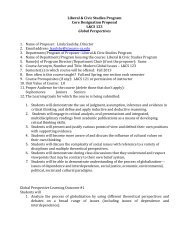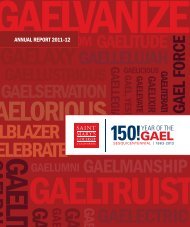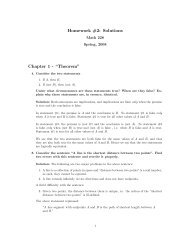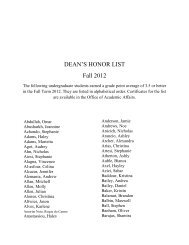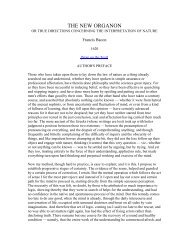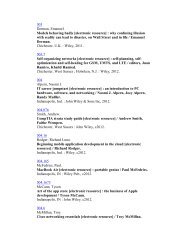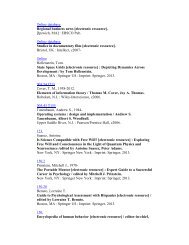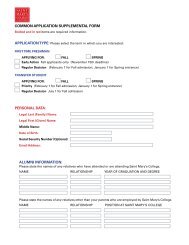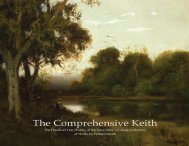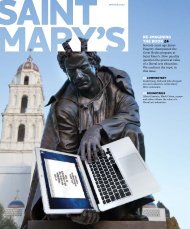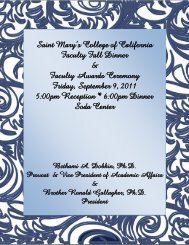2008-09 Catalog - Saint Mary's College of California
2008-09 Catalog - Saint Mary's College of California
2008-09 Catalog - Saint Mary's College of California
You also want an ePaper? Increase the reach of your titles
YUMPU automatically turns print PDFs into web optimized ePapers that Google loves.
Curriculum Anthropology127 Historical Archaeology:Material Culture and EthnicityHistorical archaeology is characterized by its use <strong>of</strong> both writtenresources and archaeological materials (such as architecture, domesticartifacts, and art) to understand the past. Historical archaeologists havebeen particularly successful in illuminating the lives <strong>of</strong> people and groupswho did not have the ability to write their own stories in ink, such asenslaved African-Americans, Indians living at <strong>California</strong> missions, the poor,and women and children. Focusing primarily on the period <strong>of</strong> time sinceEuropean exploration and colonization <strong>of</strong> the world began. Please note:Successful completion <strong>of</strong> Anth 5 is recommended, but NOT required.129 Prehistoric Archaeology: Ancient CulturesNinety-nine percent <strong>of</strong> human cultural development took place beforethe advent <strong>of</strong> written records, and therefore archaeology is the primarysource <strong>of</strong> knowledge <strong>of</strong> these cultures. This course focuses on thepractices <strong>of</strong> prehistoric people, such as how they made stone tools,decorated cave walls, organized their villages, domesticated plants, andbuilt monuments like Stonehenge. Special attention is given to topicssuch as gender, kinship, religion, and art. Please note: Successful completion<strong>of</strong> Anth 5 is recommended, but NOT required.130 Anthropological TheoryAnthropological theory is dynamic; it reflects the social climate <strong>of</strong>the times and is the product <strong>of</strong> a gradual accumulation and testing <strong>of</strong>knowledge and ideas. From the reading <strong>of</strong> primary texts, this courseprovides students with an overview <strong>of</strong> the development <strong>of</strong> anthropologicaltheory from the late 19th century to the present, pushing students tograpple with fundamental questions about what it means to be a humanbeing and a member <strong>of</strong> society. Emphasis is placed on explaining whatis essential about particular theoretical frameworks, how they can beused, and why they should be studied. Students must have completedAnth 1: Introduction to Social and Cultural Anthropology and Anth 5:Introduction to Archaeology. This course should be taken in the junioror senior year.131 Cultural Geography and Global SocietiesCultural geography studies the way people shape and give meaningto their environment and allows us to look at the fascinating variety<strong>of</strong> human activity in the world—the human landscape. Geographicknowledge is vital to understanding national and international issuesthat dominate daily news reports. This course examines the relevance<strong>of</strong> geographic methods and concepts to social science topics such asagricultural patterns and practices, ethnic traditions and conflicts, gender,health, migration, political economy, poverty, religion, resource utilization,social change and urban planning.132 Anthropological Research MethodsThe ethnographic method, developed by anthropologists one hundredyears ago, is the hallmark <strong>of</strong> anthropological research. In this coursestudents master specific exercises that represent some <strong>of</strong> the mostcommonly used data-collection techniques for ethnographic research.While the major focus will be on qualitative methodology, students arealso exposed to quantitative methods such as surveys and focus groups.Students must have completed Anth 1: Introduction to Social andCultural Anthropology and Anth 5, Introduction to Archaeology. Thiscourse should be taken in the junior or senior year.133 Senior ThesisContinuation <strong>of</strong> Research Methods course where honor students undertakeindividual research, culminating in the senior project. This should betaken in the senior year.135 Special TopicsSpecial topics in anthropology include such issues as multiculturalism,criminology, food and culture, visual anthropology, sexuality, popularculture, etc. May be repeated for credit as content varies.195 Special Study InternshipThis course is usually taken by an upper-division student who wishes tocomplete his/her education with related work experience and is maintainingat least a C average. In addition to work experience (6 – 8 hoursper week), outside research and a term project are usually required.Sponsorship by an anthropology faculty member and approval <strong>of</strong> thedepartment chair is required.197 Independent StudyThis course entails independent study or research for students whoseneeds are not met by courses available in the regular departmental <strong>of</strong>ferings.The course usually requires the writing <strong>of</strong> a term project. Sponsorshipby an anthropology faculty member and approval <strong>of</strong> the departmentchair is required.199 Special Study — HonorsThis course is only available to upper-division majors with a B averageor higher and entails independent study or research under the supervision<strong>of</strong> an anthropology faculty member. Approval <strong>of</strong> the departmentchair is required.54



